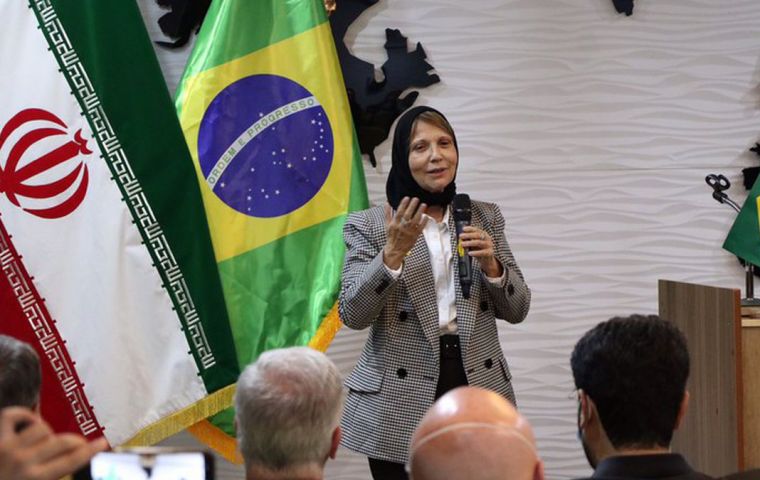MercoPress. South Atlantic News Agency
Brazil ensuring greater urea supplies from Iran in a fertilizer short world
 Minister Tereza Cristina met with top officials from Iran's National Petrochemical company looking for a larger annual supply of urea
Minister Tereza Cristina met with top officials from Iran's National Petrochemical company looking for a larger annual supply of urea While Brazilian President Jair Bolsonaro was in Moscow visiting his close friend and admired populist 'strong man' Vladimir Putin, in the midst of the escalating situation in Ukraine, and brushing off critics saying Brazil is “nobody's a puppet”, his agriculture minister was in a more strategic mission, --in another outcast country--, but crucial for the booming farming sector.
In effect agriculture and livestock minister Tereza Cristina was in Teheran signing agreements with the Iranian National Petrochemical Company, NPC, and working on prospects for Iran to triple its urea shipments to Brazil.
NPC president Morteza Shah-Mirzaei, said that urea exports to Brazil could, in a short term reach 2 million tons a year, while the volume currently shipped is 600.000 annually.
Minister Cristina confirmed Brazil's interest in more Iranian urea and highlighted the quality of the Iranian fertilizer. Urea is most used as a fertilizer to supply nitrogen to crops.
“This arrangement guarantees that Brazil is in a position to receive enough imports from Iran to step up our agro-industry. Through this partnership, we will ensure the strategic purchase of these inputs to secure efficient, continuous food production”, said the minister.
NPC president highlighted the company has more than petrochemical products, including urea, ready to supply to the market. NPC is a subsidiary of the Iranian Ministry of Petroleum, responsible for developing and controlling the Iranian petrochemical sector. It is currently the second-largest producer and exporter of petrochemical products in the Middle East.
Minister Cristina also visited Shiraz Petrochemical Company, one of the country’s main urea manufacturers. Iran’s annual urea production is estimated to be over five million tons. The majority is for the domestic market, while the remainder is exported.
During a reception at the Brazil-Iran Business Forum in Teheran, the minister stated that with the importation of soy-derived products, corn, and meat, Iran has become the largest client of Brazilian agriculture in the Middle East. However, Brazil is interested in expanding its exporting portfolio to include cotton, rice, and sugar, Cristina pointed out.
Likewise Brazil is prepared to increase purchases in Iran such as walnuts, chestnuts, and dried fruits and acquire other products such as saffron, pistachio and wheat. “I am confident that we will pursue the right path to overcome any eventual adversity and intensify bilateral trade for our mutual benefit,” she said.
Cristina underlined that barter trade is an excellent option for shipping grains and other commodities to Iran and, in the same vessels, return with urea and other petrochemicals to Brazil. “There are Brazilian trading companies that are experienced in such operations, and thus work with more attractive prices”.
Finally minister Cristina also highlighted Iran’s interest in soil and water management technologies plus irrigation systems. In this context, Brazil has a long experience, and cooperation between Embrapa and Iran's Agricultural Research, Education and Extension Organization (AREEO) can address and cooperate on these issues.




Top Comments
Disclaimer & comment rulesCommenting for this story is now closed.
If you have a Facebook account, become a fan and comment on our Facebook Page!